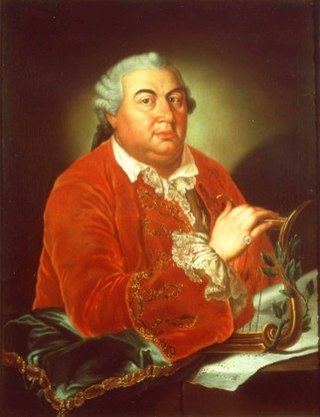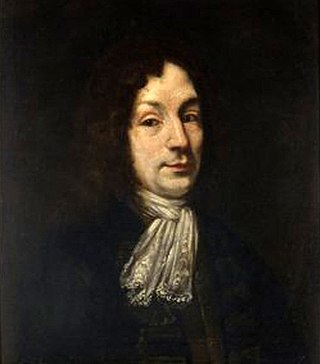
Pietro Antonio Domenico Trapassi, better known by his pseudonym of Pietro Metastasio, was an Italian poet and librettist, considered the most important writer of opera seria libretti.

Johann Adolph Hasse was an 18th-century German composer, singer and teacher of music. Immensely popular in his time, Hasse was best known for his prolific operatic output, though he also composed a considerable quantity of sacred music. Married to soprano Faustina Bordoni and a friend of librettist Pietro Metastasio, whose libretti he frequently set, Hasse was a pivotal figure in the development of opera seria and 18th-century music.

Niccolò Jommelli was an Italian composer of the Neapolitan School. Along with other composers mainly in the Holy Roman Empire and France, he was responsible for certain operatic reforms including reducing ornateness of style and the primacy of star singers somewhat.

Giuseppe Bonno was an Austrian composer of Italian origin.

Johann Adam Joseph Karl Georg Reutter, during his life known as Georg Reutter the Younger was an Austrian composer. According to David Wyn Jones, in his prime he was "the single most influential musician in Vienna".

L'Olimpiade is an opera libretto in three acts by Metastasio originally written for an operatic setting by Antonio Caldara of 1733. Metastasio’s plot vaguely draws upon the narrative of "The Trial of the Suitors" provided from Book 6 of The Histories of Herodotus, which had previously been the base for Apostolo Zeno's libretto Gli inganni felici (1695). The story, set in Ancient Greece at the time of the Olympic Games, is about amorous rivalry and characters' taking places to gain the loved one. The story ends with the announcement of two marriages.

Francesco Domenico Araja was an Italian composer who spent 25 years in Russia and wrote at least 14 operas for the Russian Imperial Court including Tsefal i Prokris, the first opera in Russian.
Demofonte is an opera seria libretto by Metastasio. The libretto was first set by Antonio Caldara in 1733, but remained popular throughout the eighteenth century and was set over seventy times.
Domenico Fischietti (1725–1810) was an Italian composer.

Giuseppe Maria Orlandini was an Italian baroque composer particularly known for his more than 40 operas and intermezzos. Highly regarded by music historians of his day like Francesco Saverio Quadrio, Jean-Benjamin de La Borde and Charles Burney, Orlandini, along with Vivaldi, is considered one of the major creators of the new style of opera that dominated the second decade of the 18th century.
Note La Giuditta may refer to one of several Italian oratorios, further elaborated below.

Gennaro Manna was an Italian composer based in Naples. He was a member of the Neapolitan School. His compositional output includes 13 operas and more than 150 sacred works, including several oratorios.

Antonio Casimir Cartellieri was a Polish-Austrian composer, violinist, conductor, and voice teacher. His reputation dissipated after his death, not to be resurrected until the late 20th century. One son was the spa physician Paul Cartellieri. Another, Josef Cartellieri, compiled some largely second-hand biographical notes about the father he scarcely knew.
La passione di Gesù Cristo is a libretto by Pietro Metastasio which was repeatedly set as an azione sacra or oratorio by many composers of the late baroque, Rococo and early classical period.

Luca Antonio Predieri was an Italian composer and violinist. A member of a prominent family of musicians, Predieri was born in Bologna and was active there from 1704. In 1737 he moved to Vienna, eventually becoming Kapellmeister to the imperial Habsburg court in 1741, a post he held for ten years. In 1765 he returned to his native city where he died two years later at the age of 78. A prolific opera composer, he was also known for his sacred music and oratorios. Although his operas were largely forgotten by the end of his own lifetime and most of their scores lost, individual arias as well some of his sacred music are still performed and recorded.

Adriano in Siria is a libretto by Italian poet Metastasio first performed, with music by Antonio Caldara, in Vienna in 1732, and turned into an opera by at least 60 other composers during the next century. Metastasio based the background of the story on late Classical works by Cassius Dio and Elio Sparziano.
Pietro Pompeo Sales was an Italian composer.

Giovanni Ambrogio Migliavacca was an Italian poet and librettist. A student and protégé of Metastasio, he was primarily active in the court theaters of Dresden and Vienna. His most successful work was the libretto for the opera Solimano, first set by Johann Adolph Hasse in 1753 and subsequently set by eighteen other composers in the following decades.












